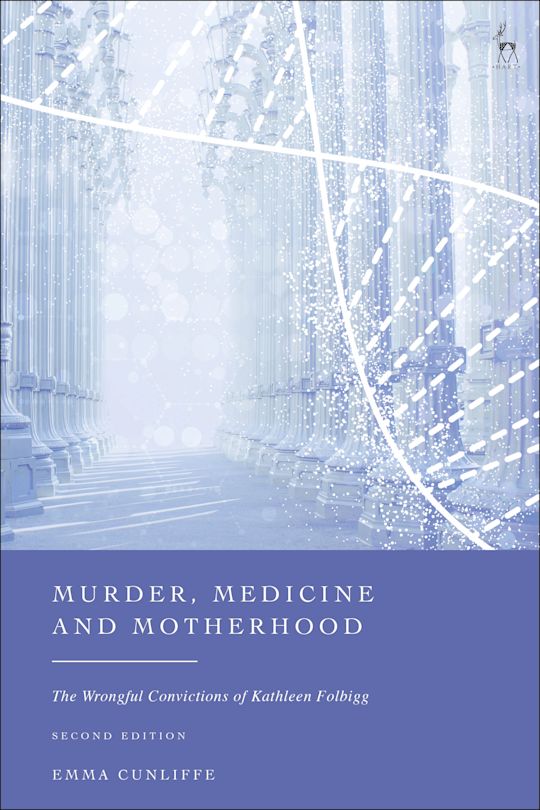Bloomsbury Home
Payment for this pre-order will be taken when the item becomes available
You must sign in to add this item to your wishlist. Please sign in or create an account
Description
The 2nd edition of Murder, Medicine and Motherhood presents a fresh examination of the case of Kathleen Folbigg and a critical evaluation of the process that led to her exoneration in 2023.
In 2011, the 2nd edition of this influential work argued that Kathleen Folbigg was wrongly convicted of killing her 4 children. The book attracted scholarly and public attention and led to medical and legal reviews of the Folbigg children's deaths.
Two subsequent inquiries examined Folbigg's convictions. In 2019, Commissioner Blanch concluded that Folbigg's guilt was “even more certain” than it had been at trial. His report provoked an unprecedented response from the Australian Academy of Science, highlighting a rift between the legal and scientific establishments over how medical evidence should be managed. A petition signed by Nobel prize winners and others demanded a further review. The 2nd inquiry, completed in 2023, adopted a markedly different approach to scientific and behavioural evidence. Commissioner Bathurst ultimately reached the “firm view” that “reasonable doubt exists as to Folbigg's guilt.”
This new edition extends the examination of the legal process, medical evidence, and normative expectations of motherhood. It evaluates law's fact-finding processes and the legal system's adherence to the principles of proof beyond a reasonable doubt, and raises concerns about how legal actors work with scientific uncertainty and assess women's credibility and demeanour.
Table of Contents
2. The Folbigg Case
3. Unexplained Infant Death: A Shifting Theory of Maternal Culpability
4. Distinguishing Homicide from SIDS
5. The Scientific Case Against Folbigg
6. A Mother Who Would Kill Her Children
7. Reading Guilt: Kathleen Folbigg's Diaries
8. Media Monster
9. Conclusion
Product details
| Published | Mar 05 2026 |
|---|---|
| Format | Ebook (PDF) |
| Edition | 2nd |
| Extent | 384 |
| ISBN | 9781509974122 |
| Imprint | Hart Publishing |
| Publisher | Bloomsbury Publishing |
About the contributors
Reviews
-
There has always been dysfunction at the interface between infant deaths and the criminal justice system. It is understandable perhaps: the emotionally combustible mixture of babies, vulnerability and wanting to protect transforming into a desire to convict and punish. … [E]ngagingly written, and unlike many books of the kind (that is, evaluations of possibly flawed convictions), it straddles the various disciplines involved seamlessly, and with insight based on substantial research. … The author, in my view very even-handedly and after a thorough analysis, does conclude that the uncertainty is such that Kathleen Folbigg has been wrongly convicted.
Professor Stephen Cordner, Victorian Institute of Forensic Medicine, Monash University
-
Murder, Medicine and Motherhood provides a detailed and nuanced analysis of the ways in which the Crown and the defence cases were respectively enabled and constrained by normative ideals of motherhood. Ideals that the Folbigg case showed to be extraordinarily, even unexpectedly, persistent and powerful. … Folbigg can tell us much about the faith in and the failures of the adversarial criminal trial and forensic sciences, the structures and practices that function to impede public accountability mechanisms such as the criminal trial.
Associate Professor Mehera San Roque, School of Law, University of New South Wales
-
A “superb methodological contribution to socio-legal research. … Cunliffe's obvious concern to be even-handed in her analysis plays out in her clear presentation of complex medical literature relating to paediatric forensic pathology, as well as detailed examination of expert testimony, long legal judgments, and court transcripts.
Murder, Medicine and Motherhood presents an extremely rich, nuanced and interesting story about unexpected infant death precisely because of the author's multi-method approach. Historically informed, theoretically provocative, accessible and clearly written, the book brings the characters involved to life with grace and empathy, despite the tragedy and horror of events.Professor Eve Darian-Smith, School of Social Sciences, University of California, Irvine
-
Cunliffe's characteristic circumspection-her caution and commitment to a thorough interrogation of multiple and interacting sources of truth production-makes her book a compelling contribution to what was once called the “new evidence scholarship.
Professor Alana Klein, School of Law, McGill University


































